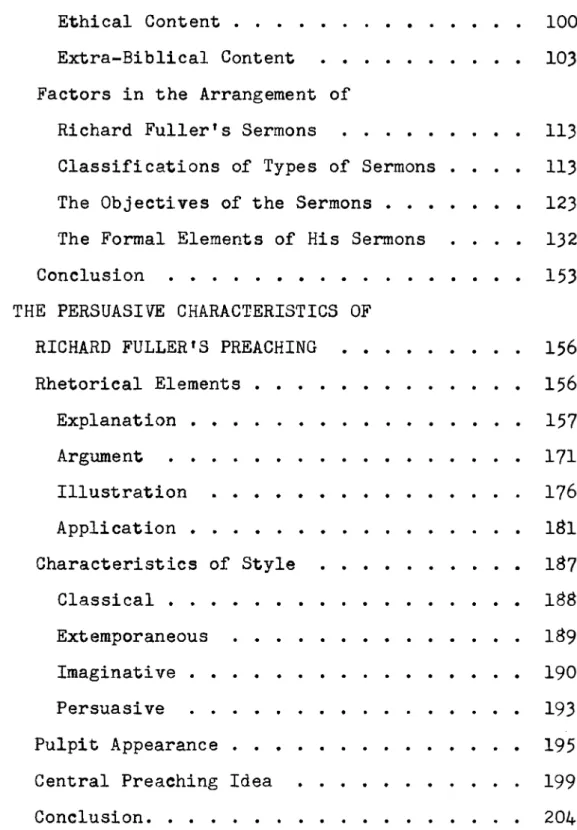Classifications of types of sermons Objectives of sermons • • • • Formal elements of his sermons Conclusion. A graduate course in the history and art of Christian preaching was held in the Preaching Department of the Southern Baptist Theological Seminary in Louisville, Kentucky. He was one of the most important preachers of the nineteenth century in America; head of the Baptist Triennial Convention; one of the organizers and later president of the Southern Baptist Convention;.
The lives and works of many leading nineteenth-century preachers, including Phillips Brooks, Henry Ward Beecher, Dwight L. Richard Fuller, the nineteenth-century Southern Baptist leader, are known to very few today due to the fact that no a thorough study had been made of the man and his preaching. The varied abilities, successes, attitudes and beliefs of this eminent preacher in the last century presented a challenge to this study in the twentieth century.
All of these materials can be found in the library of the Southern Baptist Theological Seminary in Louisville, Kentucky. Chapter III, The Sermons of Richard Fuller, was an analytical study of the content and factors of its arrangement.

CHAPTER I
While serving as a pastor in Beaufort, Fuller took a prominent place in the work of the Triennial Baptist Convention. This division presented his two major debates and some of the important smaller ones. It was a plea for a state ban on the production and sale of alcoholic beverages.
34; Savannah Resolution" of the Southern Baptist Convention in 1861, and then his editorial on the "Savannah. In the three years before the meeting of the Triennial Convention in 1844, the slavery issue gained momentum. At the request of the editor of the Christian Reflector of Philadelphia,126 Richard Fuller wrote a letter.
As a result of the slavery issue and other problems, Southern Baptists decided to form their own Convention. In 1861, when the Southern Baptist Convention met in Savannah, Fuller was president of the Convention. For more than a third of his life he was considered the leader of the Baptist slaves in the South.
In 1857 Fuller entered into a debate with some Southern Baptist brethren on the subject.
CHAPTER II
In this part, his idea of using theology in preaching was discussed. In discussing Richard Fuller's theology, it is necessary to examine his concept of the use of theology in preaching. The doctrine of the Gospel of Christ was evident in every sermon and discourse of Richard Fuller.
His conception of the Gospel was discussed under four ideas: its origin, its revelation, its power and man's relationship to the Gospel. In general, Fuller believed that the Baptists were people who wanted to carry out the great principle of the Reformation. Baptist by conviction and was a leader in preaching the doctrines held by the Baptists.
This portion of the chapter dealt with Richard Fuller's ethical principles as revealed in his preaching. Fuller applied the ethical principles of the gospel of Christ to every aspect of life. Richard Fuller believed that the true mission of the gospel was the rebirth of a devastated world.7l.
103 Fuller defined righteousness as the true religion, the doctrine and spirit of the gospel. The government and the churches were reflections of the individuals, therefore the basis of morality. Fuller believed that the key to successful preaching was the theme of the crucifixion, which was foremost in the preacher's mind, heart and message.
Richard Fuller believed that the preacher's style should be governed by his own taste and ability. The preacher's enthusiasm was not to be let loose, but to be kept within the bounds of his design. He believed that the two glaring faults of the American pulpit were prolixity and bombast.
He advocated these concepts for the Christian preacher as the most beneficial for the fulfillment of the divine call to preach the Gospel in the whole world. An analysis of his theology, ethical principles and conception of preaching was necessary for a study of the man and his preaching.
CHAPTER III
With this lofty conception of the Bible, Fuller used it widely in his sermons. The Bible, but in all his use of the Bible it was the record of God's revelation and the only authentic one. The atonement—the substitutionary suffering of the Savior—is the great central truth in the gospel system.
These statements are illustrative of Fuller's direct use of theology in his sermons. A partial list of the various men he referred to in his sermons is included. First, I say that a man who lived in Jerusalem, .in the days of the apostles, had evidence of the truth of the.
In the first section of the sermon he asked this question regarding the earthly life of Jesus as a historical fact.~. In his introduction the subject. was stated or derived and the content of the introduction was in line with the topic. All of Fuller's sermons moved in the same direction, to the heart and mind of the hearer.
There was a lack of proportion in the length of the divisions; The third division took nearly half the time of the sermon. He chose the most appropriate type to explain the truth of the particular Scripture. 3. In the discussion he gave the meaning of the words and ideas in the text.
68 The logical conclusion of this argument in light of the facts reduced this argument to absurdity.